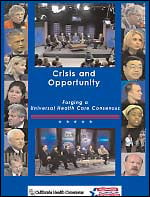“Like it or not, if we pay $1,500 per car for health care and our cheap global competitors pay $200, that’s a disadvantage. … Another possibility is leveraging the buying power of the government, which is the biggest purchaser of health care under Medicare….” – Rick Wagoner, CEO of General Motors
Why We Need Universal Health Care
California needs a universal health care system because 7 million Californians are uninsured and millions more are on the brink of losing coverage due to skyrocketing costs. Many of those that have coverage, and the employers that provide it, have been forced to significantly reduce health care benefits and treatment options. According to a recent U.C. Berkeley study, by 2010 employers will provide health insurance to only half of California’s working adults.
Divorce, job changes, or moving to a new area all increase the likelihood that anyone could lose coverage. Middle-income families are joining the ranks of the uninsured faster than any other group. 
In 2005, medical bills were responsible for half of all bankruptcies. Of the approximately 1 million Americans who file for bankruptcy each year as a result of illness, most have college degrees, are working and own their homes. Three-quarters have insurance.
Under the current system:
- People are waiting longer for appointments.
- Fewer people are getting a doctor of their choice.
- Pre-existing illnesses are being used to deny coverage.
- People are forced to skip doctor appointments and delay care, making treatment more expensive and damaging health.
- Of those with insurance, 1 in 4 say they have opted to not get needed medical care due to high costs.
- Middle-income Californians now face a greater threat of being uninsured or underinsured than ever before.
Read FTCR’s comprehensive report about problems and solutions in the health care system.
Perhaps the most perplexing aspect of the dysfunctional system is that preventive care is often denied to the uninsured. Those without health insurance are required to wait until illness is critical before being treated in hospital emergency rooms, where care is more expensive and space and resources are in short supply. Overcrowded emergency rooms lead to diversions of patients to other hospitals, delaying care when care is needed most.
Lack of a Systemwide Plan
The health care system is rudderless. There are no uniform rules or a plan to coordinate it. Too many special interests are making decisions for their individual benefit rather than for the good of patients. As a result, patients are prisoners of a dysfunctional bureaucracy. The human cost is great, as is the financial cost.
Most patients talk about a complicated health care system, endless voice mail, and poor information. Quality reporting is undertaken by numerous private and governmental agencies with little integration or public disclosure of meaningful information. As a result of a lack of transparency, consumers and patients cannot judge the quality and value of their care.
Business Owners
In just the last 15 years, the cost of health care for a family has increased 400% while the national minimum wage increased just 20%.
As Rick Wagoner, CEO of General Motors, recently told the New York Times, “Like it or not, if we pay $1,500 per car for health care and our cheap global competitors pay $200, that’s a disadvantage. … Another possibility is leveraging the buying power of the government, which is the biggest purchaser of health care under Medicare….”
Business’ lost productivity – from employees forced to work sick or take time off to recover from untreated illness – threatens the state’s economic engine.
Read a recent op-ed about the effect of the health insurance market on business owners and the need for a California Medicare program open to all patients.
Nurses
Due to wasteful spending and excessive industry profits nurses face continued workforce threats, thus removing the front line of caregivers from the patients who need them most.
Physicians
While some individual doctors and physician groups have learned to thrive in a market void of regulation, more than one hundred physicians groups in California have closed their doors in recent years because payments from insurers and government reimbursements were inadequate. Many physicians have left the state or the profession altogether.
Community Clinics
Community health clinics often provide a critical bridge to care for the uninsured, and could play an even larger role in providing preventive care. In 2003, 55% of all community clinic visits were made by the uninsured. However, roughly 12% of all visits were not compensated.
Hospitals
For most hospitals, the lack of a system-wide plan has resulted in budget shortfalls due to uncompensated care for the uninsured. In the last 10 years, 60 emergency rooms in California have been forced to close their doors. Meanwhile, some hospitals have achieved breathtaking profit margins by gaming the system and defrauding public programs.
Regulators
Regulators do not have the tools they need to ensure that consumers, employers, doctors, nurses, hospitals and others are adequately protected. No state agency has the authority to coordinate the entire health care system. Very little is done currently to ensure that the prices paid for care are equal to the benefit provided.


